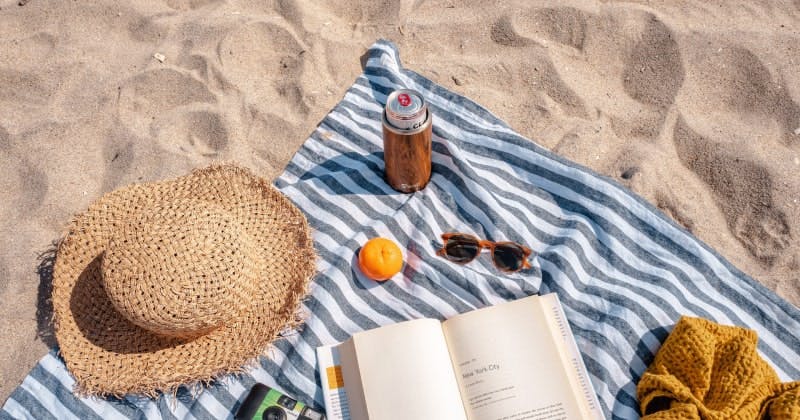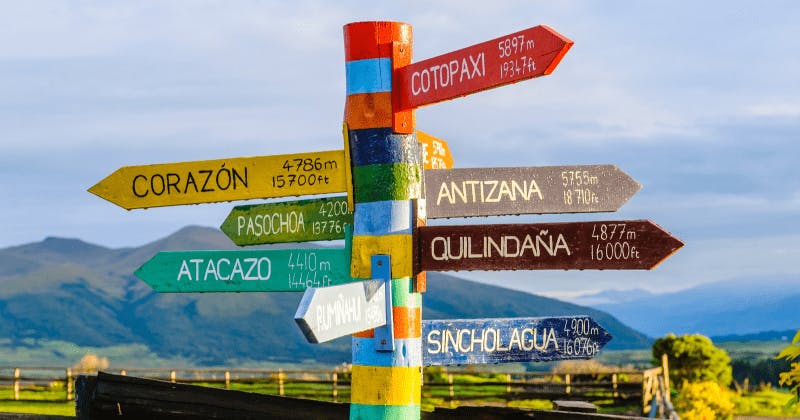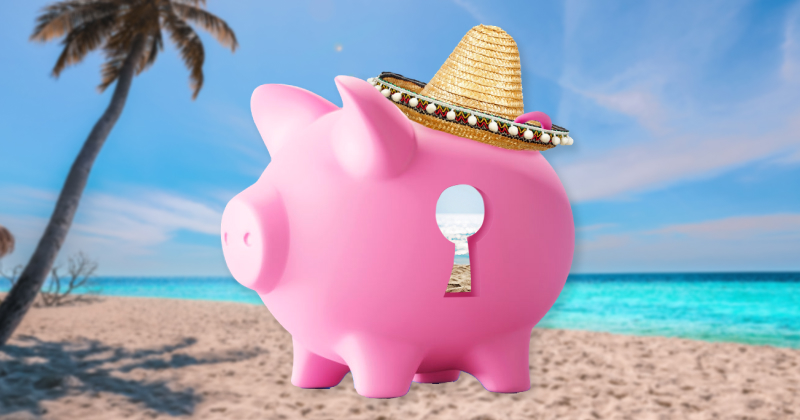
Ultimate Holiday Checklist
We've done a lot of travelling and packed more than our fair share of suitcases. We've got the know-how and it's only right we share it!
The essentials
Family holiday checklist
Beach holiday checklist
Walking holiday checklist
Pre-holiday checklist
Holiday checklist FAQs
The Essentials
✓ Valid passport✓ Boarding passes
✓ Visa
✓ Insurance documents
✓ Credit card/cash
✓ ID/Driving licence
✓ Foreign currency
✓ Medication/first aid
✓ Face mask
✓ Hand sanitiser
✓ Keys
Travel Accessories
✓ Travel adaptors✓ Children's booster seats
✓ Sun cream
Jetting off on holiday?
Sign up and save up to 20% off deals on those important holiday extras like airport parking!
Quick-view Holiday Checklists
What sort of holiday do you have planned?
Family holiday checklist
✓ Backpack✓ Paracetamol
✓ Baby wipes
✓ Toys
✓ Nappy changing bag
✓ Tablets/reading material
✓ Family-friendly games
✓ Beach games
Beach holiday checklist
✓ Beach towels✓ Sunglasses
✓ Sun cream
✓ Swimswear
✓ Insect repellent
✓ Water bottle
✓ Books/podcasts/audiobooks
✓ Beachball/Inflatables
✓ Flip-flops
✓ Goggles
Walking holiday checklist
✓ Hiking poles✓ Hiking boots
✓ Backpack
✓ Water bottle
✓ Map
✓ GPS
✓ Power bank
✓ Camera
✓ Flask
✓ Food containers
✓ Raincoat
Holiday planning and checklists
Avoid the stress and plan like the best.
Whether you're travelling abroad or staying in the UK, being prepared is a great idea so use our holiday packing checklist to get things under control. We've put together plenty of tips and hints to help you get to your holiday with minimum stress.
Check out our list of Best Travel Apps - our top picks will help you during the planning stages of your holiday and while you're away.
Here are a few things to think about before you go:
Pre-holiday checklist:
✓ Check any visas or IDs you may need
✓ Check you have your mask and hand sanitiser
✓ Buy holiday insurance
✓ Keep an eye on the weather at your destination
✓ Change currency/buy a pre-paid currency card
✓ Find out about local attractions
✓ Research emergency medical procedures at your destination (especially contact numbers)
✓ Check you're up to date on any jabs you might need
✓ Research places to eat while you're on holiday, especially if you have dietary requirements
Thinking about going away with the little ones this year? Make sure you check our dedicated UK school holidays page for all the info you need before you book your family getaway. Or if you're thinking about making your escape over a bank holiday, check out our UK bank holidays page.

Psssst! Hey, you, the holiday planner...
If you're planning your holiday and looking for an easy way to see our best deals then our app featuring HEHA! (the Holiday Extras Holiday Assistant) is perfect for you. Let HEHA! do the hard work by sorting all our deals and tailoring them specifically for you. Download our app now to see what recommendations HEHA! has for you, set price alerts and view your bookings all in one place.


Frequently Asked Holiday Checklist Questions
What are the most common holiday planning questions?
There's a lot to think about when you're getting ready for a holiday, and not just what your first pool-side cocktail will be. We've put together some of the most asked questions by holidayers to help make sure you're ready to hit the beach, the slopes, or anywhere in between and make the most of your rest and relaxation time.
What should I not forget to pack?
What are the things you can't do without? From the big stuff like passports and tickets, to your favourite flip-flops and suntan lotion - here's a quick list of items that people often forget:
- Passport - It's a classic! Don't be that cliché
- Face mask and hand sanitiser - Keep yourself and other travellers safe.
- Booking confirmations - Everything you've booked - hotels, transfers, attractions, car hire, travel - make sure you have all of these somewhere safe.
- An umbrella or raincoat - You just never know.
- Swimwear - Even if this isn't a beach holiday, there may be a hotel pool to take advantage of and swimwear takes up very little space in your luggage.
- Travel socket adaptors - Don't get caught short with your electrical devices.
- An extension cord - Simply attach your adaptor to the end of a 4-way socket extension cord and get plenty of power for phones, cameras, hairdryers and all your other mod-cons.
- Phone charger - The last thing you want is to be caught with a dead battery.
- First aid kit - Bumps and bruises can be picked up anywhere and sometimes all you need is a quick plaster. A travel first aid kit can be a handy little companion on your holiday.
- A laundry bag - Dirty clothes are a reality of holidays, so rather than accumulating a pile of them in the corner of your room, bring a simple bag to pop them in. You can even make a tote bag out of an old t-shirt to keep your clean clothes separated.
- Toothbrush and toothpaste - It's likely that your hotel will have these if you do forget, but it's worth bringing your own.
- Sun cream and lip balm - Make sure you look after yourself while you're out in the sun, nothing can ruin a holiday like chapped lips and the lobster look.
- Painkillers - Whether it's for the morning after an enthusiastic night out or just a little too much hiking, painkillers might help!. Just make sure you're aware of local laws regarding certain medications.
Is a handbag classed as hand luggage?
Generally speaking a handbag would count as a personal item and not as hand luggage. You should be allowed one personal item like a handbag, laptop bag or other similar small bag as well as your hand luggage, but make sure to check the specific rules for your airline.
Can you have clothes in your hand luggage?
Yes, you can have clothes in your hand luggage – just make sure your carry-on conforms to any restrictions that your airline may have on cabin luggage. Top tip: Wear your heaviest clothes on the plane to free up some space in your hold luggage.
How long does it take to get a passport?
It should only take 3 weeks for you to get a passport, whether it's a brand new one or a renewal of an expired one. If you don't fill in the forms correctly or they require more information it can take a little longer to get it, so it's best to do this well in advance of your holiday. There are some costs involved in getting your passport – if you apply online it's £75.50, or you can fill in the paper form (get this from the Post Office) which costs £85.00.
If you need to renew your passport in a bit of a rush there are a few options:
Online premium: Book your appointment online, apply for your passport and pay the fee of £177.00. Turn up to your appointment with the required materials and you'll be given your passport there and then. Appointments last up to 30 minutes.
Paper premium: You can get the form from the Post Office but you'll still need to book your appointment and pay the £177.00 fee online. You'll then need to take your completed form and any required documents to the appointment. You'll usually get your passport within 4 hours of your appointment.
1 week Fast Track: You'll still need to get a paper form from the Post Office and book an appointment online as well as pay the fee of £142.00 (£122.00 for a child passport). You'll still need to take everything to your appointment but rather than having to wait around for your passport after the appointment, it's posted to you within 1 week.
Can I have a phone charger in my hand luggage?
Absolutely! In fact, it's very useful to keep your phone charger in your hand luggage if you're using your phone to keep yourself entertained on a long flight.
What is not allowed in carry-on?
- Any liquid in a container over 100ml (3.4 oz) - This is the case even if the container isn't full.
- Sharp objects - Including knives of any length, scissors, razor blades, hypodermic needles (if these are required for medical reasons they're allowed but you'll need to show proof).
- Tools of any kind - Including multi-tools and penknives.
- Sporting equipment - Anything from ski poles to darts.
How much should you pack for 2 weeks?
Being prepared is key to a great holiday experience and you certainly don't want to run out of clothes while you're away.
A lot will depend on the type of holiday you're planning, whether it's a beach holiday, two weeks of glitz and glamour or living it up in a ski resort. But below we'll give you a rough idea to get you started based on a 2 week beach holiday.
- Swimwear - 4-5 sets should see you through comfortably, particularly if you won't be swimming every day.
- Underwear - 1 pair for each day of your holiday. It's probably worth packing some spare socks if you plan on doing any hiking or long walks, though.
- Trousers/jeans - 2-3 pairs of something casual and comfortable but smart enough to wear on nights out to the restaurant if you feel like being a little fancy.
- Shorts - 1-2 pairs of comfy shorts should be enough for the days where you might like to take a tour of the local towns or do something aside from relaxing on the beach.
- T-shirts/shirts - 8-10 of these depending on your plans and potential washing facilities. A combination of t-shirts, tank tops and shirts/blouses should prepare you for most eventualities.
- Dresses - 3-4 evening dresses and a couple of light summery dresses should do the trick.
- Jumper/cardigan/hooded top - It's certainly worth bringing one of these just in case the evening turns a bit chilly!
- Sunhat - Protect yourself from sunstroke and look fashionable while you're at it.
- Sunglasses - We'd suggest bringing a couple of pairs just in case your main set gets lost or broken, a backup is definitely better than squinting for the rest of your trip!
Is it better to roll or fold clothes?
For items like t-shirts, jeans, swimsuits, underwear and pyjamas, it's better to roll than fold - you'll save plenty of luggage space doing so. Bigger, bulkier items like jumpers are better folded; as are button-up shirts as these are likely to crease and crumple when rolled.
How do I choose a good suitcase?
Choosing the right suitcase can be quite the task. There's plenty to consider - size, style, colour, not to mention finding one that you feel comfortable carrying.
Depending on what type of trip you're going on, a 2 or 4-wheel case might be right for you:
2 wheels - classic upright | Great on rougher terrain, going up and down curbs and over cobblestones.
4 wheels - the spinner | An absolute whizz around the airport, on smooth floors these suitcases glide along.
Which is better: hard case luggage or soft?
Both styles of suitcase have their advantages and disadvantages:
| Hard case | Soft case | ||||
|---|---|---|---|---|---|
| ✓ Durable. the construction of these suitcases means they're more robust and more likely to protect your belongings | ✓ Flexible. Soft case luggage will allow for more flexibility in terms of what you pack inside it, in particular if you have any oddly shaped souvenirs. This can also be a plus when trying to squeeze your luggage into tight spots | ||||
| ✓ Secure. Should anyone be looking to gain access to your suitcase they are less likely to try it with a hard case as they can't just easily cut the material | ✓ Compartments. You'll normally find that soft case luggage has more internal and external pockets than hard case, making it much easier to organise your belongings | ||||
| ✓ Style. You'll often find that these types of suitcases are available in a range of stylish finishes | ✓ Price. More often than not soft case luggage will be cheaper than it's hard case counterpart | ||||
| ✓ Weather resistance. While not waterproof, hard cases are much more resistant to bad weather | |||||
| ✗ Less forgiving. As the frame of hard cases is rigid there's very little give if you have something oddly shaped to fit into it. | ✗ Security. Due to the nature of the materials used soft cases can be considered less secure than hard cases, someone determined to gain entry could cut through the material | ||||
| ✗ Space. Although you'll still get bags (sorry!) of space, hard cases don't tend to have external pockets which can be handy for keeping travel documents etc. | ✗ Weather resistance. You may find that your soft case doesn't stand up to adverse weather quite as well as a hard case, even if your belongings remain dry this could lead to staining and discolouration of that case. | ||||
Holiday Extras Travel Guides
Find your travel inspiration and plan a hassle-free trip.







